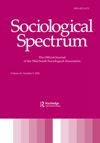“这是一种生活方式”:社会阶层、灵活性和年轻人关于定义成年的故事
IF 1.1
3区 社会学
Q2 SOCIOLOGY
引用次数: 7
摘要
摘要在讨论社会阶层在向成年过渡期间的重要性时,阶级起源和未来阶级轨迹的同时重要性没有得到充分的探讨。在这篇论文中,我对美国60名新兴成年人进行了采访,调查他们在新兴成年时期走向成年的故事。我发现,无论阶级背景和轨迹如何,参与者都同意三个主观标准——身份探索、学习责任和获得控制权——这对成年项目来说是最重要的。然而,关于达到这些主观标准的个人故事因未来的课堂计划而有所不同。虽然那些处于阶级优势(中产阶级和中上层阶级)轨道上的人在很大程度上借鉴了传统的、具体的成年标记来解释主观期望的实现,但那些处于阶级劣势(工人阶级和贫困阶级)轨道的人强调了“灵活性”的重要性,这在他们关于成年的故事中同样重要。虽然新兴成年人使用主观标准来解释成年,但这种主观性也有助于掩盖获得物质资源和沿着规范道路过渡到成年的机会的持续重要性。主体性也允许新兴成年人的故事个性化,这有助于掩盖更广泛的不平等模式。本文章由计算机程序翻译,如有差异,请以英文原文为准。
“It’s a Lifestyle”: Social Class, Flexibility, and Young Adults’ Stories About Defining Adulthood
Abstract In discussions of how social class matters during the transition to adulthood, the simultaneous importance of both class origins and future class trajectories is underexplored. In this paper, I use interviews with 60 emerging adults in the United States to investigate their stories about progress towards adulthood during the emerging adult years. I find that regardless of class backgrounds and trajectories, participants agree on three subjective criteria—identity exploration, learning responsibility, and gaining control—as most important to the project of becoming an adult. However, personal stories about living up to these subjective criteria diverge by future class plans. While those on class-advantaged (middle- and upper-middle-class) tracks draw heavily from traditional, concrete markers of adulthood to explain the accomplishment of subjective expectations, those on class-disadvantaged (working-class and poor) tracks stress the importance of “flexibility” as important in their stories about becoming an adult. While emerging adults use subjective criteria to explain reaching adulthood, this subjectivity also helps conceal the ongoing importance of access to material resources and opportunities for transitioning to adulthood along a normative path. Subjectivity also allows for individualization in emerging adults’ stories, which helps obscure broader patterns of inequality.
求助全文
通过发布文献求助,成功后即可免费获取论文全文。
去求助
来源期刊

Sociological Spectrum
SOCIOLOGY-
CiteScore
3.80
自引率
5.60%
发文量
16
期刊介绍:
Sociological Spectrum publishes papers on theoretical, methodological, quantitative and qualitative research, and applied research in areas of sociology, social psychology, anthropology, and political science.
 求助内容:
求助内容: 应助结果提醒方式:
应助结果提醒方式:


